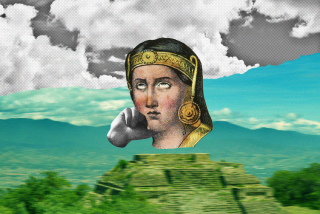Portugal and Spain Rivals Again as Columbus’ 500th Anniversary Nears
- Share via
LISBON, Portugal — Spain’s plans to stage a headline-grabbing 500th birthday party for America in 1992 have stirred up a storm of controversy over how Portugal is celebrating its own discoverers who were charting the Atlantic before Christopher Columbus was born.
Spain and Portugal were archrivals in the push in the 15th and 16th centuries to sail off the end of known maps and find new worlds. Both succeeded.
But now, many Portuguese fear that their neighbors are stealing the limelight for the 1992 fiesta.
At the center of Spain’s celebrations is Seville’s Expo ‘92, a 530-acre international fair that is set to end a six-month run Oct. 12, 1992, 500 years to the day after Columbus reached the Caribbean island of San Salvador.
Also making Spain hot property in 1992 will be the summer Olympics in Barcelona. And the European Community has chosen Madrid as its cultural capital on the eve of the trading bloc’s deadline to create a single European market.
Next to all that, Portugal’s 1992 celebrations seem lackluster.
Lisbon’s government-appointed National Discoveries Commission is promoting research, exhibitions and the publishing of more history books about the era.
It has commissioned American composer Philip Glass to write an opera for 1992 release, based probably on the Lusiads--an epic poem about Vasco da Gama’s voyages that was written by Portugal’s 16th Century roving bard, Luis de Camoes.
But the Spaniards got there first by casting Catalan soprano Montserrat Caballe and tenor Jose Carreras in “Cristobal Colon,” an opera based on trials and tribulations of the Genoese captain. It sold out when it premiered in Barcelona in September.
News media, executives and even historians here have called for more glamour to promote Portugal’s past glories and to show that it is a rapidly modernizing European country.
“I’m ashamed at how my country is celebrating the discoveries,” said Waldemar de Abreu, a Lisbon publisher and editor of “The Portuguese Christopher Columbus--Secret Agent of King Dom Joao II,” a 600-page book that claims to prove that the explorer was Portuguese.
“Portugal could easily have pooled resources with Spain and staged an Iberian discoveries exhibition in 1992,” De Abreu said.
While admitting that Spain “is pegging all the force of its modernization on 1992,” Vasco Graca Moura, head of the commission’s executive board, makes no apologies for not going overboard in 1992.
“The main difference is that Spain is only commemorating one date and a short journey--Columbus’ voyage in 1492 to the West Indies,” he said.
“Our celebrations began last year with Bartolomeu Dias and will only end in 2000, with Pedro Alvares Cabral.”
Spurred by their pioneering Prince Henry the Navigator’s studies of astronomy and cartography, Portuguese seafarers had claimed the island of Madeira and the mid-Atlantic Azores archipelago by 1430.
Dias took his ship around the Cape of Good Hope in 1488, leaving Da Gama to open up the sea route to India 10 years later.
Cabral discovered Brazil in 1500, the Portuguese went east of India to Japan, and Fernao de Magalhaes--better known as Magellan--closed the circle in 1520 by commanding the first expedition to sail around the world.
“Our commemorations match our dimension--we’re smaller than Spain, so honestly we can’t be as elaborate,” said the commission’s Antonio Mega Ferreira, though adding that Portugal still has a few tricks up its sleeve.
Lisbon recently submitted its candidacy to the Paris-based International Exhibitions Bureau, to hold Expo ‘98--a three-month international fair, only about a tenth the size of Seville’s.
Instead of trying for the Olympics, Portugal is expected to bid in January to hold soccer’s World Cup in 1998.
Expo ‘98’s theme will be East meets West, its hero--Vasco da Gama. Graca Moura argues that Da Gama’s trips to the Orient were as important as Columbus’ discovery in the West.
Mega Ferreira’s plans for Expo ’98 include a subway train connecting the undeveloped left bank of the Tagus estuary with Lisbon’s historic Belem district.
Belem is already the site of three ornate monuments to the discoveries--Belem tower and Jeronimos monastery, and former dictator Antonio Oliveira Salazar’s colossal, caravel-shaped padrao --a pillar that navigators used to leave behind them to mark the spread of the Portuguese empire.
Salazar in 1940 organized an exhibition called “O Mundo Portugues,” the Portuguese world, that glorified the country’s discoveries and its African empire to distract attention from World War II and its isolation in Europe.
“The (center-right) government has a complex of being linked to Salazar. They’re frightened they’d be accused of nationalism if they did more to glorify our history,” De Abreu said. “But nobody’s accusing Spain’s Socialist government of anything, and what is Seville if not a glorification of Spain’s colonial past?”
More to Read
Sign up for Essential California
The most important California stories and recommendations in your inbox every morning.
You may occasionally receive promotional content from the Los Angeles Times.













